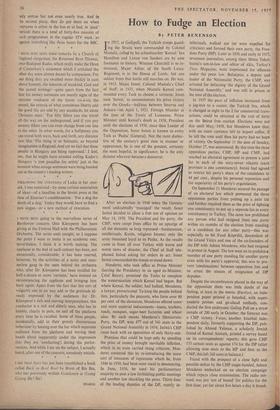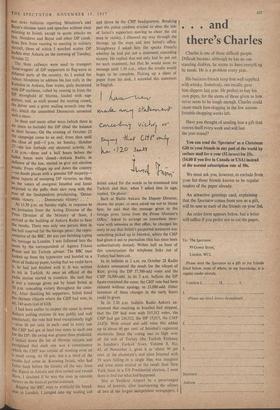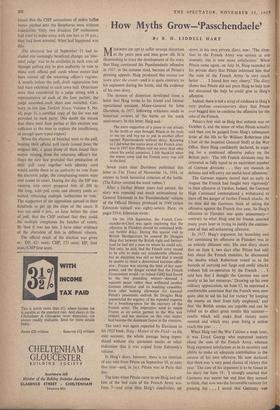How to Fudge an Election - By PETER BENENSON I N
1915, at Gallipoli, the Turkish troops guard- ing the Straits were commanded by Colonel Mustafa, called by his schoolteacher 'Kemal.' Ian Hamilton and Liman von Sanders are by now footnotes to history, Winston Churchill is in re- tirement, Major Attlee, of the South Lancs. Regiment, is in the House of Lords; but one soldier from that battle still marches on. He wag, in 1915, Major Ismet, Colonel Mustafa's Chief of Staff; in 1935, when Mustafa Kemal com- manded every Turk to choose a surname, Ismet took to commemorate his great victory over the Greeks—halfway between Smyrna and Ankara—'on April 1, 1921. Foreign Minister at the time of the Treaty of Lausanne, Prime Minister until Kemal's death in 1938, President until the elections of 1950, since then Leader of the Opposition, Ismet Inontl is known to every Turk as `Pasha' (General). Not the most distinc- tive of the century's great Men in manner *or appearance, he is one of the greatest, certainly the most hopeful, in significance; he is the only dictator who ever became a democrat.
After an election in 1946 when the Govern- ment undoubtedly 'managed' the result, Ismet Monti decided to allow a fret test of opinion on May 14, 1950. The President and his party, the CHP, were swept from office by an upsurge of all the elements so long repressed—businessmen, intellectuals, Kurds, religious Imams; only the army remained loyal to its Pasha. As the results came in from all over Turkey with worse and worse news of disaster, the Chief of Staff tele- phoned Monti asking for orders to act. Ismet Monti commanded-the troops to stand down'. - Menderes, who took office as Prime Minister (leaving the Presidency to an aged ex-Minister, celal Bayar), promised the Turks to complete the westernisation which Kemal had begun. But where Kemal, the soldier, had bullied, Menderes, a lawyer, prevaricated. To keep the people behind him, particularly the peasants, who form over 80 per cent, of the electorate, Menderes offered more' and more material inducements—loans, tradors, roads, mosques, sugar-beet factories and wheat silos. By such means Menderes's Democratic Party, the DP, won 477 out of 541 seats in the Grand National Assembly in 1954; Intinti's CHP came back with an opposition of only thirty-one.
Promises that could be kept only by speeding the print of money brought inevitable inflation, which in its train carried rising criticism. Men- deres answered this by re-introducing the same sort of measures of repression which he, from 1946 to 1950, had been most vocal in denouncing. In June, 1956, he used his parliamentary majority to pass a law forbidding public meetings and another law shackling the press. Thirty-four of the leading deputies of the DP, mostly in- tellectuals, walked out (or were expelled for criticism) and formed their own party, the Free- dom Party (HP). Later in 1956 and early in 1957, seventeen journalists, among them Metin Toker, Intinirs- son-in-law and editor of Akis, Turkey's Time Magazine, were imprisoned for offences Under the press law. Bolukpasi, a deputy and leader of the Nationalist Party, the CMP, was arrested for defaming 'the dignity of the Gfand National Assembly,' and was still in prison at the time of the election.
In 1957 the pace of inflation increased from a jog-trot to a canter; the Turkish lira, which is changed at eight to the for commercial trans- actions, could be obtained at the rate of forty on the Beirut free market. Elections were not ' due until May, 1958, but Menderes knew that, with no more currency left to import coffee, if he left the vote until then his party had no hope of victory. On September 11 the date of Sunday, October 27, was announced. By this time the three opposition parties, CHP, HP and CMP, had reached an electoral agreement to present a joint list in each of the sixty-seven vilayets (each province is one constituency). Inonil had agreed to restrict his party's share of the candidates to 44 per cent., despite his personal reputation and the superiority of his party's organisation.
On September 11 Menderes secured the passage of an electoral law which prevented the three opposition parties from putting up a joint list and further required them as the price of fighting one constituency to put up a separate list in every constituency in Turkey. The same law prohibited any person who had resigned from one party within six months of the election from standing • as a candidate for any other party—this was especially to hit Fuad Koprillii, descendant of the Grand Vizirs and one of the co-founders of the DP with Adrian Menderes, who had resigned in protest in August. The law went on to prohibit a member of one party standing for another party even with his party's approval; this was to pre- vent `combinations' between opposition lists and to arrest the stream of resignation of DP deputies.
Despite the encumbrances placed in the way of the opposition there was little doubt of the feeling, at least in the towns. litirriyer, an inde- pendent paper printed in Istanbul, with super- modern presses and go-ahead methods, con- ducted the first embryonic Gallup Poll on a straw sample of 200 early in October; the forecast was a CHP victory. Vatan, another Istanbul inde- pendent daily, formerly supporting the DP, pub- lished by Ahmed Yelman, a scholarly Jewish friend of Kemal Ataturk, printed a survey based on its correspondents' reports; this gave CHP 155 certain seats as against 171 for the DP (after allowing nine seats to the HP and four to the CMP, this left 268 seats in balance.) Faced with the prospect of a close fight and possible defeat by the CHP single-handed, Adnan Menderes embarked on an election campaign which repays close examination. The radio net- work was put 'out of bound' for politics for the first time; yet for about five hours a day it broad- cast news bulletins reporting Menderes's and flayar's election tours and speeches without once referring to Monti, except to quote attacks on him. Menderes and Bayar and other DP candi- dates flew from meeting to meeting in military aircraft, three of which I watched scatter DP leaflets over Ankara on the morning of Tuesday, October 12.
The State railways were used to transport `band-wagons' of DP supporters to flag-wave in different parts of the country. As I waited for Adnan Menderes to address his last rally in the Kurtulus in Ankara, four trains, gaily decorated With DP emblems, rolled by coming in from the 1:11) stronghold of Manisa, loaded with sup- Porters, and, as each passed the waiting crowd, the driver sent a great wailing screech into the sky, which the assembled Democrats answered With a cheer.
In these and many other ways (which there is no space to include) the DP tilted the balance in their favour. On the evening of October 23 the campaign came to an end; from then until the close of poll-5 p.m. on Sunday, October 27—the law forbade any electoral activity. At 1.30 p.m.—three and a half hours before the ballot boxes were closed—Ankara Radio, in defiance of the law, started to give out election results. From villages up and down the country
no doubt places with a genuine DP majority— tame reports of sweeping DP victories, so that, as the voters of marginal Istanbul and Izmir swarmed to the polls, their ears rang with the roar of the loudspeakers proclaiming, 'Demo- cratic victory. . . . Democratic victory! . .
At 11.30 p.m. on Sunday night, in response to an invitation from the Acting Director of the Press Division of the Ministry of State, I arrived at the building of Ankara Radio to hear the results. There was only one person then in the hall reserved for the foreign press : the repre- sentative of the BBC. He was just finishing typing his message to London. I was followed into the room by the correspondent of Agence France Presse and his Turkish adviser. The BBC man looked up from the typewriter and handed us a sheet of foolscap paper, saying that we could have It, he had just finished with it. It was written in ink in Turkish. At once an official of the radio station started to translate. He said that it was a message given out by Ismet Inonti at 10 P.m. conceding victory throughout the coun- try. After thanking his supporters, Intinii listed the thirteen vilayets where the CHP had won, in all, 140 seats (out of 610).
I had been earlier to inspect the count in seven Ankara polling stations (it was public and well conducted); the vote had been exceptionally high --over 90 per cent. in each—and in every one the CHP had got at least two votes to each one for the DP; the swing was greater than predicted. 1 looked down the list of thirteen vilayets and recognised that each one was a constituency Which the CHP was certain of winning even on a small swing. At 10 p.m. not a a third of the results had come in. Knowing Inonii, who had fallen back before the Greeks all the way from the "Egean to Ankara and then turned and routed them, I doubted if he was the man to concede Victory on the basis of partial evidence.
Begging the BBC man to withhold his broad- olst to London, I jumped into my waiting cab
and drove to the CHP headquarters. Breaking past the police cordons erected to stem the tide of Iniinfi's supporters moving to cheer the old man in victory, I elbowed my way through the throngs, up the steps and into Indnirs office. Straightway I asked him (he speaks French) whether he had put out a statement conceding victory. He replied that not only had he put out no such statement, but that he would issue no message until 1.30 a.m., when the results would begin to be complete. Picking up a sheet of paper from his desk, I scrawled this statement in English.
Inonil asked for the words to be translated into Turkish dnd then, when I asked him to sign, replied, `De plaisir.'
Back at Radio Ankara the Deputy Director, shown the paper, at once asked me not to blame him; he said that the message given to the foreign press 'came from the Prime Minister's Office.' Asked to arrange an immediate inter- view with someone in that office, he changed his story to say that Inonli's purported statement was something picked up in Istanbul, where the CHP had given it out to journalists (this has since been authoritatively denied). Within half an hour of this conversation the telephone links out of Turkey had been cut.
In its bulletin at 2 a.m. on October 28 Radio Ankara announced the result for the vilayet of Rize, giving the DP 37,500-odd votes and the CHP 38,000-odd. In its 3 a.m. bulletin the DP figure remained the same; the CHP vote had been reduced without apology to 23,000-odd. Other instances of these changes in the early hours could be given.
In its 2.30 a.m. bulletin Radio Ankara an- nounced that counting in Istanbul had stopped, that the DP had won with 315,312 votes, the CHP had got 246,922, the HP 15,015, the CMP 24,826. With mixed and odd votes this added up to about 60 per cent. of Istanbul's registered electorate. Since the voting was so high over all the rest of Turkey (the Turkish Embassy in London's Turkish News, Volume 8, No. 43, of November 1, gives it as 'about 90 per cent. of the electorate'), and since Istanbul with 39 seats falling in a single bloc was marginal and even more critical to the result than New York State in a US Presidential election, I went there to find out what had happened.
Met at Yesilkoy Airport by a prearranged team of lawyers, after interviewing the editors of two of the largest independent newspapers, 1 found that the CHP accusations of stolen ballot boxes pitched into the Bosphorus were without foundation. Only two drunken DP enthusiasts had tried to make away with one box at 10 p.m.; they had been arrested. What had happened was this.
The electoral law of September 11 had in- cluded one seemingly beneficial change; an 'elec- toral judge' was to be available in each area all through polling day to give authority to vote to those with official poll cards whose names had been missed off the returning officer's register. A month before the poll, draft registration lists had been exhibited in each town hall. Objections were then considered by a judge sitting with a representative of each of the four parties; the judge amended each sheet and initialled. Con- trary to law (see Turkish News, Volume 8, No. 42, page 3), a certified copy of the list was not provided to each party. (No doubt the excuse that there were- four parties at this election was sufficient at the time to explain the insufficiency of enough spare typed copies.) When the electors of Istanbul went to the poll, bearing their official poll cards (issued from the original list), a great many of then' found their names missing from the returning officer's list. Since the new law provided that production of their poll card together with identity card would entitle them to an authority to vote from the. electoral judge, the complaining voters were sent round to court. During the day the DP was running into court prepared lists of 200 to 300 long, with 'poll cards and identity cards at- tached, obtaining multiple 'authorities to vote.' The supporters of the opposition queued in their hundreds to get up the steps of the court. It was not until 4 p.m., an hour before the close of poll, that the CHP realised that they could file multiple complaints for batches of voters. By then it was too late. I have other evidence of the alteration of lists in different vilayets.
The official result of the election was given as : DP, .421 seats; CHP, 173 seats; HP, four seats; CM P four seats.




































 Previous page
Previous page